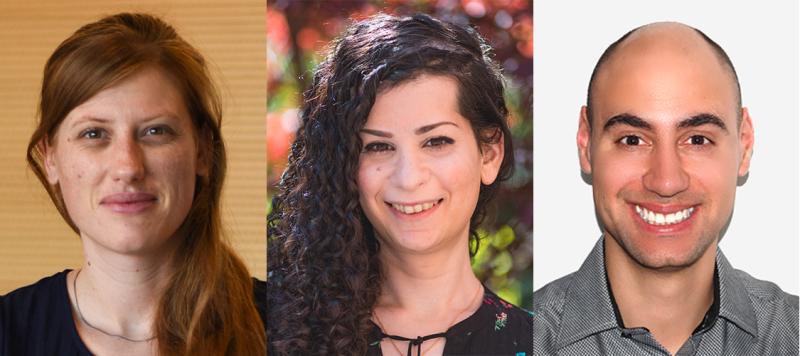July 9, 2021 | Volunteer & Awards
U of T alumni win awards for groundbreaking dissertations

Left to right: Ina Anreiter (PhD 2019), Hannah Kia (PhD 2019) and Keith Lawson (PhD 2020) have all won awards for their doctoral theses.
University of Toronto alumni Ina Anreiter (PhD 2019) and Hannah Kia (PhD 2019) have won the prestigious CAGS-ProQuest Distinguished Dissertation Awards for 2020 – marking the first time in the award’s 27-year history that students from the same institution have won both the arts and the sciences categories. In addition, Keith Lawson (PhD 2020) is the 2021 winner of an annual award recognizing the best doctoral thesis in the University of Toronto’s Donnelly Centre for Cellular and Biomolecular Research.
Administered by the Canadian Association for Graduate Studies and sponsored by ProQuest, the CAGS-ProQuest awards recognize Canadian doctoral dissertations that make unusually significant and original contributions to their academic communities and to Canadian society at large. They are given annually in two categories: engineering, medical sciences and natural sciences, and fine arts, humanities and social sciences.
Anreiter and Kia earned their PhDs in 2019. Anreiter, whose supervisor was University Professor Marla Sokolowski (BSc 1977 UC, PhD 1981) of the department of ecology and evolutionary biology, is currently finishing up a second postdoctoral fellowship as a Stanford Science Fellow. Kia, whose supervisor was Professor Lori E. Ross (PhD 2002) of the Dalla Lana School of Public Health, is an assistant professor at the University of British Columbia.
“To be recognized in both categories – an unprecedented honour – is a testament to the innovation and original thinking we have been able to foster at U of T,” says Charmaine Williams (MSW 1993, PhD 2002), acting dean of the School of Graduate Studies. “I’m incredibly proud of our students for their commitment and intellectual rigour, and incredibly grateful to the faculty, staff, and community members who make U of T such an enriching place.”
Her dissertation made innovative discoveries about how genes regulate multiple functions
“It’s very humbling,” says Ina Anreiter, whose dissertation took home the top prize in the Engineering, Medical Sciences and Natural Sciences category. “I know there are so many great theses across Canada, and only one award for a very diverse and very big section of science.”
Anreiter's dissertation focused on the molecular basis of pleiotropy (when a gene has multiple functions) and how this is regulated transcriptionally at the level of RNA. Specifically, Anreiter studied pleiotropy of the Drosophila (fruit fly) foraging gene and its multiple functions in behaviour and metabolic traits, leading to innovative discoveries about the gene’s regulation.
In about six months’ time Anreiter will return to her beloved Toronto, this time as an Assistant Professor in the Department of Biological Sciences at the University of Toronto Scarborough. “I love Canada,” she smiles. “I’m so excited to come back to my alma mater.”
Her study of older gay men has significant implications for health-care delivery to populations that often avoid health care as a result of stigma
McGill University professor Shari Brotman (PhD 2000) described Kia’s award-winning dissertation as “one of the most impressive manuscripts I have had the opportunity to read over the course of my career.”
It examines the health-care encounters of older HIV-positive and HIV-negative gay men with a view toward redressing the homophobia and stigmatization that have characterized these encounters historically. The findings have significant implications for policy, practice, and health-care delivery to populations that often avoid health care as a result of actual or anticipated stigmas.
“I feel so honoured to be receiving the CAGS-ProQuest Dissertation Award,” says Kia, whose work is informed by an abiding passion for social justice and many years of experience as a clinical social worker. “I really hope that the insights of my thesis can be leveraged to change health-care systems so that they are more responsive to the many impacts of HIV/AIDS history on the well-being of aging gay men.”
He discovered almost 200 genes which hold clues to making cancer immunotherapy available to more patients
Lawson completed his PhD in the lab of Jason Moffat (PhD 2002), a professor of molecular genetics in the Donnelly Centre, where he investigated how cancer becomes resistant to treatment. The research was part of Lawson’s medical training in the surgeon scientist program at U of T’s department of surgery and it was preceded by three years of residency in the clinic.
“I think it’s important for clinicians to stay engaged in discovery science,” says Lawson. “Having our perspective is important right from the discovery side of things and I think that helps us ask clinically meaningful questions.”
During his PhD, Lawson found a way to starve cancer cells of key nutrients in order to shrink tumours, publishing his findings in the journal Nature Metabolism. In another study, published in Nature, he discovered almost 200 genes which hold clues to making cancer immunotherapy available to more patients.
“Keith was an outstanding student with an incredible drive to use systematic genetics approaches for clinically relevant questions related to cancer,” says Moffat. “He was passionate about kidney cancer and made important discoveries related to lipid metabolism and cytotoxic T lymphocyte killing of cancer cells.”

